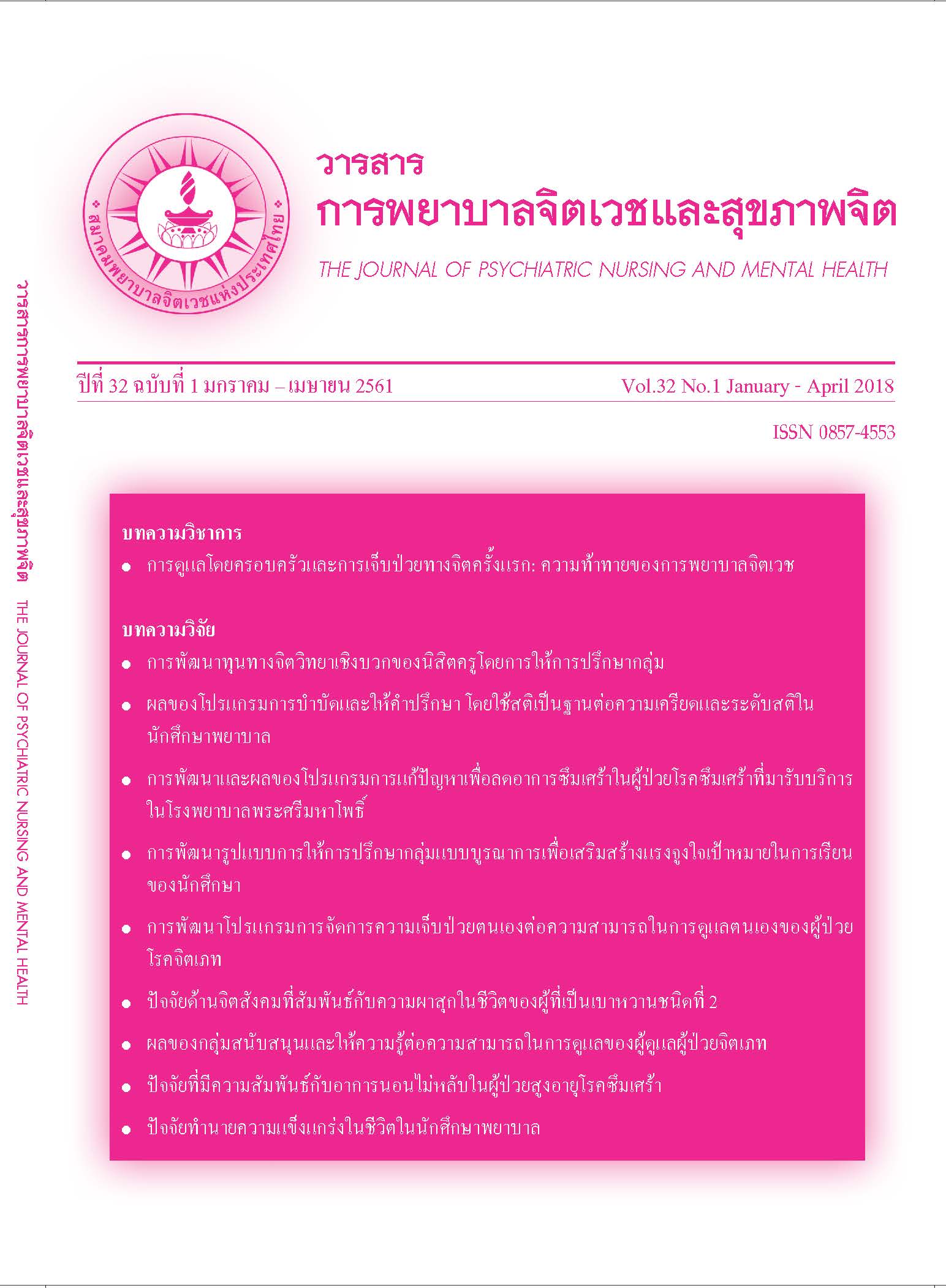THE DEVELOPMENT AND EFFECT OF THE PROBLEM SOLVING THERAPY ON DEPRESSIVE SYMPTOMS FOR MAJOR DEPRESSIVE DISORDERS AT PRASRIMAHABHODI PSYCHIATRIC HOSPITAL
Main Article Content
Abstract
Objectives: The aims of this study were to develop and investigate the effects of Problem Solving Therapy program on reducing depressive symptoms and remission of depressed patients in Prasrimahabhodi psychiatric hospital.
Methods: This study was a research and development study. The process started with 1) situation analysis, followed by 2) development of the prototype of Problem Solving Therapy (PST) and then 3) investigated the effects of the developed program on 17 Major Depressive Disorder (MDD) patients who did not receive antidepressants. The primary outcome was depressive symptoms assessed by 9 questions of depression assessment (9Q) and Hamilton Rating Scale for Depression-17 (HRSD-17) at immediately, 1 and 3 month after program completion. Program was implemented at Prasrimahabodi psychiatric hospital in 1 year. Descriptive statistics and paired t test were used for data analysis.
Results: The problem solving therapy consisted of 7 sessions. After the experiment, mean score of depressive symptoms was significantly lower than that before. The mean differences assessed at immediately, 1 and 3 month after program completion by 9Q were 8.23 (95%CI = 6.89-9.57), 8.70 (95%CI = 7.30-10.11), and 8.88 (95%CI = 7.49-10.26), respectively and by HRSD-17 were 8.18 (95%CI = 5.62 - 10.74), 8.53 (95%CI =6.17-10.29), and 9.42 (95%CI = 7.41-11.53), respectively. Remission rate assessed at immediately, 1 and 3 month after program completion by 9Q were equal at 88.23% , and by HRSD-17 were 82.35%, 88.23%, and 94.12%, respectively. Patients had reasonable problem solving. After implementation of the program in nursing services at Prasrimahabhodi psychiatric hospital, higher remission rate and shorter length of stay of MDD patients were found.
Conclusion: Results from this study suggested that problem-solving therapy was effective in reducing depressive symptoms and remission in MDD patient at Prasrimahabhodi psychiatric hospital. Therefore, it should be considered as a viable option for the treatment of MDD patients with mild to moderate depression.
Article Details
บทความที่ได้รับการตีพิมพ์แล้ว เป็นลิขสิทธิ์ของสมาคมพยาบาลจิตเวชแห่งประเทศไทย
References
Alexopoulos, G. S., Raue, P. J., Kiosses, D. N., Mackin, R. S., Kanellopoulos, D., McCulloch, C., & Areán, P. A. (2011). Problem Solving Therapy and Supportive Therapy in Older Adults with Major Depression and Executive Dysfunction:Effect on Disability. Archives of general psychiatry, 68(1), 33-41. doi: 10.1001/archgenpsychiatry.2010.177
Arean, P., Hegel, M., Vannoy, S., Fan, M.-Y., & Unuzter, J. (2008). Effectiveness of Problem-Solving Therapy for Older, Primary Care Patients With Depression:Results From the IMPACT Project. The Gerontologist, 48(3), 311-323. doi:10.1093/geront/48.3.311.
Bell, A. C., & D’Zurilla, T. J. (2009). Problem solving therapy for depression: A meta analysis. Clinical Psychology Review, 29(4), 348-353. doi: https://doi.org/10.1016/j.cpr.2009.02.003
Cape, J., Whittington, C., Buszewicz, M., Wallace, P., & Underwood, L. (2010). Brief psychological therapies for anxiety and depression in primary care: meta-analysis and meta-regression. BMC Medicine, 8, 38-38. doi: 10.1186/1741-7015-8-38
Cuijpers, P., Van Straten, A., & Warmerdam, L. (2007). Problem solving therapies for depression: A meta-analysis. European Psychiatry, 22(1), 9-15. doi:https://doi.org/10.1016/j.eurpsy.2006.11.001
D’Zurilla, T. J., & Nezu, A. M. (2007). Problem solving therapy: a positive approach to clinical intervention. Newyork: Springer publishing company.
Eskin, M., Ertekin, K., & Demir, H. (2008). Efficacy of a Problem-Solving Therapy for Depression and Suicide Potential in Adolescents and Young Adults. Cognitive Therapy and Research, 32(2), 227-245. doi: 10.1007/s10608-007-9172-8
Gellis, Z. D., & Kenaley, B. (2007). Problem-Solving Therapy for Depression in Adults: A Systematic Review. Research on Social Work Practice, 18(2), 117-131.doi: 10.1177/1049731507301277
George S. Alexopoulos, M. D., Christopher F. Murphy, P. D., Faith M. Gunning-Dixon, P. D., Vassilios Latoussakis, M. D., Dora Kanellopoulos, B. S., Sibel Klimstra, M. D., . . . Matthew J. Hoptman, P. D. (2008). Microstructural White Matter Abnormalities and Remission of Geriatric Depression. American Journal of Psychiatry, 165(2), 238-244. doi: 10.1176/appi.ajp.2007.07050744
Kessler, R. C., & Bromet, E. J. (2013). The epidemiology of depression across cultures. Annual review of public health, 34, 119-138. doi: 10.1146/annurev-publhealth-031912-114409
Kongsuk, T., Arunpongpaisal, S., Loiha, S., Maneeton, N., Wannasawek, K., Leejongpermpoon, J., et al. (2007). Development and validity of 9 questions for assessment of depressive symptom in Thai I-san community. Presented at the 6th Annual International Mental Health Conference, Bangkok, Thailand.
Lotrakul, M., Sukanich, P., & Sukying, C. (1996). The Reliability and Validity of Thai version of Hamilton Rating Scale for Depression. Journal of the Psychiatric Association of Thailand, 41(4), 235-246.
Nezu, A. M., Nezu, C. M., & Clark, M. A. (2008). Risk factors in depression. San Diego: Elsevier.
Randall, J. R., Walld, R., Finlayson, G., Sareen, J., Martens, P. J., & Bolton, J. M. (2014). Acute Risk of Suicide and Suicide Attempts Associated With Recent Diagnosis of Mental Disorders: A Population-Based, Propensity Score–Matched Analysis. Canadian Journal of Psychiatry, 59(10), 531-538.
Train The Brain Forum Committee. (1994). Thai Geraitric Depression Scale. Siriraj Hospital Gazette, 46, 1-9.


